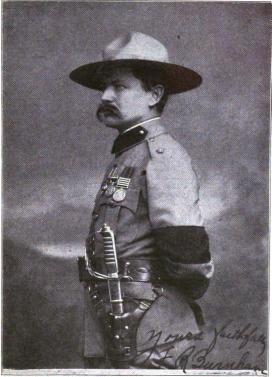|
|
|
|
| Major Alan Wilson Shangani Last Stand: by JOHN HAYS HAMMOND |
|
It was my good fortune to enjoy for seven years an intimate association with Cecil John Rhodes, who Was not only the most remarkable man I have ever known, but, taking him all in all, the most thoroughly to be admired. |
 |
I was his friend. I was engaged with him in the active management of great business enterprises. I was his companion in adventurous roamings through trackless wilderness inhabited by ferocious beasts and hostile natives. I have been with him in camp where lions roared close at hand, to be kept off only by a wall of fire and the firing of guns, and not prevented even by such means from snatching our donkeys or occasionally a native boy.
To capture Lobengula, Colonel Forbes, in command of the white settlers, called for volunteers, and thirty- eight of the many men who responded to the call were sent, under Major Wilson, to cross the Shangani River to capture the King from the midst of his regiments, which later on, it was ascertained, numbered 7,000 men.Of these volunteers only three returned alive. The Wilson patrol was entirely surrounded by these hordes of Matabele. Finding themselves in this predicament, they ringed their horses together and shot them to form a barricade.
|
|
But just before doing this Major Wilson asked Burnham if he thought it possible to ride through the natives and to bring a message to Forbes to come to the relief of the patrol. Forbes at that time was on the opposite side of the Shangani River, about four miles distant, with the main column and the Maxim guns. Burnham, though admitting that he thought it impossible to reach Forbes, nevertheless said he would undertake it.
|
| |
|
He selected Ingram, an American, and Gooding, an Australian, to accompany him. By very skilful woodcraft, much fighting, and good luck they succeeded in cutting their way through the surrounding hordes of impis and reached the Shangani River, which was at that time in flood. They succeeded in swimming the river, only to find that Forbes himself was engaged in a very desperate fight with thousands of other Matabele and that it was then too late for Forbes to render the desired assistance.
Lobengula died two months later. When I visited this part of the country with Rhodes the following year, we learned from natives who were engaged in the Wilson massacre that it cost Lobengula 80 men of the royal blood and 500 warriors to kill Wilson and his 34 men. It was said that Wilson was among the last of the men to fall, and that the wounded men loaded their rifles and passed them to him in the last stages of the defense. But finally, when both his arms were broken and he could no longer shoot, he stepped from behind the barricade of their horses and walked toward the Matabele, who were firing.
Then it was that a young warrior advanced toward him and stabbed him with a spear, and as he withdrew the spear Wilson still continued to approach him. In fear the young warrior shouted, "This man is bewitched; he cannot be killed!" and threw away his spear as Wilson fell forward on his face dead.
We were also told by the natives that in a lull of the firing the heroic Englishmen sang a song that the natives often heard them sing in the church at Victoria {now Masvingo}. It was the national anthem.
Later the bones of the Wilson patrol were gathered, and they now rest beside the grave of their great chief, Rhodes, ie the Matopos Mountains.
|
|
|
| Related Documents |
| Occupation of Shangani |
| |
|
| If you feel this is not an
accurate profile and you have a more accurate one, or
you have a clarification , you can submit your version of the Profile here |
|
|
|
|
| |
|